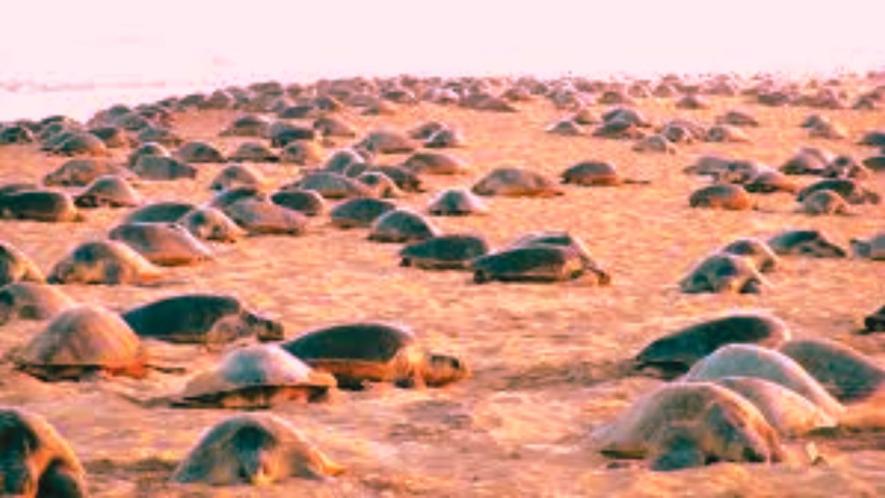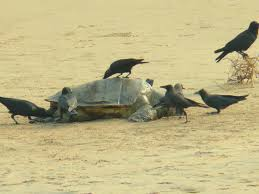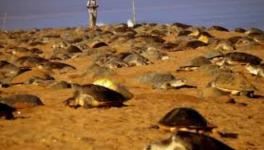Olive Ridleys Inching Toward Extinction in Few Decades

The Odisha coast has a reputation of being the largest rookery in the world for Olive Ridley sea turtles who come from several seas to three major coasts for laying eggs.
It is simply the homing instinct of any species that attracts them from thousands of kilometres, swimming all the way, negotiating several challenges.
When they arrive on the respective spots, such as Gahirmatha, Devi River mouth and Rushikulya coast the beaches wear a rare spectacle as thousands and even lakhs of these turtles sit on their pits to lay eggs.
"In contrast, there are heart-wrenching sights all over the beaches when hundreds, and even thousands, of dead turtles dot the landscape, which is so frightening for nature lovers. Every year, along the Odisha coast, more than 15,000 sea turtles (Olive Ridley) die unnatural deaths due to illegal fishing activity" said Biswajit Mohanty, an environmental activist who is leading turtle conservation campaigns.
This is a shocking reality. Species that are legally protected under Wildlife Protection Act (1972) as Schedule 1 species, do exist even before dinosaurs. They are something we should not allow to perish so soon, he says.
Now-a-days, the sight of dead Olive Ridley turtles has become a common sight along coasts and river mouths. Be it Rushikulya, Debi river mouth or along the coast in Gahirmatha, such sights are given less and less attention by the authorities concerned. For the wildlife department, since the past many years, the casualties have remained confined to statistics. And the government, as a whole, has never laid emphasis to arrest or minimise the causes behind such unnatural deaths due to rampant illegal fishing activities.
One of the oldest living species on earth, Olive Ridley is one of the many such species, like Leather-back, Loggerheads, Hawksbill and a few others dating back to the period much before the time of dinosaurs.

As regards the Olive Ridley turtles, the coasts of Odisha so far remained a safe destination for nesting. Among these, Gahirmatha, Rushikulya and Debi river mouths are prominent sites where the Olive Ridleys have homing instincts for many years. After mating off-shore, the females arrive at the beach where they dig holes in the sand to lay eggs. When their hatchlings emerge, they drift off with the tidal waves and migrate to their feeding grounds, several thousand kilometres away.
Although there is no empirical study to ascertain the numbers, hundreds of thousands of these turtles head for the coasts of Odisha for nesting between December and April.
Causes of Death and Remedies
"Illegal fishing by motorised boats and fishing trawlers are few reasons behind the deaths. Mainly before the month when the turtles keep mating in the deep sea, they face accidents by such vessels and get fatally injured or die" Mohanty said.
The prohibition on fishing in deep sea at such times are never enforced with the seriousness required to be attached and the result is obvious. Ironically, many of them get entangled in fishing nets and often die of asphyxiation and injuries.
Besides unnatural deaths, the other reason that looms over this innocent species is the demand for their eggs. Each turtle lays eggs numbering about 100 to 150 in the pits and many of them are devoured by animals straying on the beach. The other reason is the high protein content in the eggs as well as the demand for turtle meat in parts of Odisha and West Bengal .
A study showed that over 50,000 turtles are transported from the coasts of Odisha to Kolkata during the nesting season every year.
Amid all this, the ‘vigil’ by the forest and wildlife department results in them allegedly choosing to look the other way.
The demand for turtle meat and eggs had raised eyebrows more so because India is part of Appendix 1 of Convention of International Trade in Endangered Species of Wildlife flora and fauna. Yet, somehow, lack of grassroot vigil either by the wildlife or fisheries department remains a major bottleneck.
Also, nesting sites often fall victims to effects of oceanic storms, erosion of beaches and surge in commercial activities that create disturbances through illumination etc. Oil spills from the mechanised vessels are also a growing threat for these turtles, despite a regulation prohibiting deep sea fishing within 20 km of Gahirmatha coast and other such coasts where turtles come for nesting.
Disappearing Hatchlings
“Another major threat for the Olive Ridley population is the rising mortality of hatchlings after they emerge from the egg pits, and in some cases when they fail to emerge from the pits because of compaction of sand particles" said Mohanty,
Born in crores each year, lakhs of these turtles get either buried and, in a few cases, once out of the pits, they fall prey to predators or lose direction of the sea and get killed. This naturally has become a major set-back for turtle conservation because the survival rate of hatchlings is poor, with one in 1,000 hatchlings reaching adulthood.
It is time the authorities emerged out of their hard-shelled complacency to enforce foolproof conservation and protection. Else, if this species disappears from the ecosystem, maybe, a repeat irony of dinosaurs cannot be ruled out.
The writer is a freelance journalist based in Odisha.
Get the latest reports & analysis with people's perspective on Protests, movements & deep analytical videos, discussions of the current affairs in your Telegram app. Subscribe to NewsClick's Telegram channel & get Real-Time updates on stories, as they get published on our website.
























